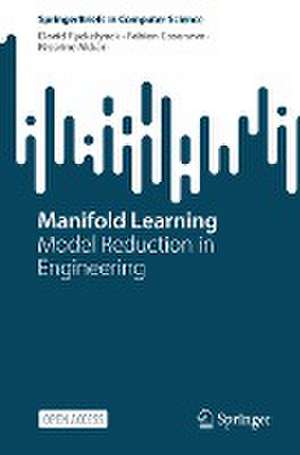Manifold Learning: Model Reduction in Engineering: SpringerBriefs in Computer Science
Autor David Ryckelynck, Fabien Casenave, Nissrine Akkarien Limba Engleză Paperback – 21 feb 2024
Projection-based reduced order models are the projection of mechanical equations on a latent space that have been learnt from both synthetic data and experimental data. Various descriptions and representations of structured data for model reduction are presented in the applications and survey chapters. Image-based digital twins are developed in a reduced setting. Reduced order models of as-manufactured components predict the mechanical effects of shape variations. A similar workflow is extended to multiphysics or coupled problems, with high dimensional input fields. Practical techniques are proposed for data augmentation and also for hyper-reduction, which is a key point to speed up projection-based model order reduction of finite element models.
The book gives access to python libraries available on gitlab.com, which have been developed as part of the research program [FUI-25] MORDICUS funded by the French government. Similarly to deep learning for computer vision, deep learning for model order reduction circumvents the need to design parametric problems prior reducing models. Such an approach is highly relevant for image-base modelling or multiphysics modelling.
Din seria SpringerBriefs in Computer Science
-
 Preț: 475.83 lei
Preț: 475.83 lei - 20%
 Preț: 166.97 lei
Preț: 166.97 lei - 20%
 Preț: 325.63 lei
Preț: 325.63 lei - 20%
 Preț: 349.13 lei
Preț: 349.13 lei - 20%
 Preț: 302.48 lei
Preț: 302.48 lei -
 Preț: 381.81 lei
Preț: 381.81 lei -
 Preț: 446.47 lei
Preț: 446.47 lei - 20%
 Preț: 296.17 lei
Preț: 296.17 lei - 20%
 Preț: 335.65 lei
Preț: 335.65 lei - 20%
 Preț: 406.90 lei
Preț: 406.90 lei - 20%
 Preț: 323.00 lei
Preț: 323.00 lei - 20%
 Preț: 322.35 lei
Preț: 322.35 lei - 20%
 Preț: 321.85 lei
Preț: 321.85 lei - 20%
 Preț: 232.68 lei
Preț: 232.68 lei -
 Preț: 375.45 lei
Preț: 375.45 lei - 20%
 Preț: 323.00 lei
Preț: 323.00 lei - 20%
 Preț: 322.81 lei
Preț: 322.81 lei - 20%
 Preț: 324.17 lei
Preț: 324.17 lei - 20%
 Preț: 323.00 lei
Preț: 323.00 lei - 20%
 Preț: 322.17 lei
Preț: 322.17 lei - 20%
 Preț: 322.50 lei
Preț: 322.50 lei - 20%
 Preț: 323.34 lei
Preț: 323.34 lei - 20%
 Preț: 324.17 lei
Preț: 324.17 lei - 20%
 Preț: 323.46 lei
Preț: 323.46 lei - 20%
 Preț: 322.17 lei
Preț: 322.17 lei - 20%
 Preț: 322.02 lei
Preț: 322.02 lei -
 Preț: 341.50 lei
Preț: 341.50 lei - 20%
 Preț: 324.49 lei
Preț: 324.49 lei -
 Preț: 344.47 lei
Preț: 344.47 lei -
 Preț: 376.80 lei
Preț: 376.80 lei -
 Preț: 377.18 lei
Preț: 377.18 lei - 20%
 Preț: 324.17 lei
Preț: 324.17 lei - 20%
 Preț: 352.26 lei
Preț: 352.26 lei - 20%
 Preț: 321.32 lei
Preț: 321.32 lei - 20%
 Preț: 322.17 lei
Preț: 322.17 lei - 20%
 Preț: 324.17 lei
Preț: 324.17 lei - 20%
 Preț: 322.02 lei
Preț: 322.02 lei -
 Preț: 374.46 lei
Preț: 374.46 lei - 20%
 Preț: 320.21 lei
Preț: 320.21 lei - 20%
 Preț: 323.34 lei
Preț: 323.34 lei - 20%
 Preț: 324.17 lei
Preț: 324.17 lei - 20%
 Preț: 231.84 lei
Preț: 231.84 lei - 20%
 Preț: 294.95 lei
Preț: 294.95 lei - 20%
 Preț: 322.50 lei
Preț: 322.50 lei - 20%
 Preț: 323.46 lei
Preț: 323.46 lei -
 Preț: 374.08 lei
Preț: 374.08 lei -
 Preț: 408.23 lei
Preț: 408.23 lei - 20%
 Preț: 321.52 lei
Preț: 321.52 lei - 20%
 Preț: 323.34 lei
Preț: 323.34 lei - 20%
 Preț: 323.00 lei
Preț: 323.00 lei
Preț: 222.68 lei
Preț vechi: 278.36 lei
-20% Nou
Puncte Express: 334
Preț estimativ în valută:
42.61€ • 44.60$ • 35.46£
42.61€ • 44.60$ • 35.46£
Carte tipărită la comandă
Livrare economică 31 martie-14 aprilie
Preluare comenzi: 021 569.72.76
Specificații
ISBN-13: 9783031527661
ISBN-10: 3031527666
Pagini: 107
Ilustrații: X, 107 p. 31 illus., 25 illus. in color.
Dimensiuni: 155 x 235 mm
Greutate: 0.18 kg
Ediția:2024
Editura: Springer Nature Switzerland
Colecția Springer
Seria SpringerBriefs in Computer Science
Locul publicării:Cham, Switzerland
ISBN-10: 3031527666
Pagini: 107
Ilustrații: X, 107 p. 31 illus., 25 illus. in color.
Dimensiuni: 155 x 235 mm
Greutate: 0.18 kg
Ediția:2024
Editura: Springer Nature Switzerland
Colecția Springer
Seria SpringerBriefs in Computer Science
Locul publicării:Cham, Switzerland
Cuprins
Structured Data and Knowledge in Model-based Engineering.- Learning Projection-based Reduced-order Models.- Error Estimation.- Resources: Software and Tutorials.- Industrial Application: Uncertainty Quantification in Lifetime Prediction of Turbine Blades.- Applications and Extensions: A Survey of Literature.
Notă biografică
David Ryckelynck is working on model-based/physics-based engineering assisted by machine learning. He did seminal works on hyper-reduction methods, in the field of applied mathematics and computational mechanics. He is the head of a lecture on Ingénierie Digitale Des Systemes Complexes (Data Science for Computational Engineering) at Mines Paris PSL University.
Fabien Casenave is a research scientist at Safran Tech, the research center of Safran Group, a French multinational company that designs, develops and manufactures aircraft engines, rocket engines as well as various aerospace and defense-related equipment or their components. As head of the Physics-Informed AI and Numerical Experiments team, Fabien has been working on model-based/physics-based engineering assisted by machine learning applied to industrial design challenges in structural mechanics.
Nissrine Akkari is a research scientist at Safran Tech. She has been working on model-based/physics-based engineering assisted by machine learning applied to industrial design challenges in computational fluid dynamics.
Textul de pe ultima copertă
Caracteristici
Shows how manifold learning uses model order reduction and deep learning for training models in continuum mechanics Discusses high dimensional input variables in mechanical models, in particular for image-based digital twining Proposes practical techniques such as data augmentation or hyper-reduction in order to reduce high dimensional models This book is open access, which means that you have free and unlimited access
